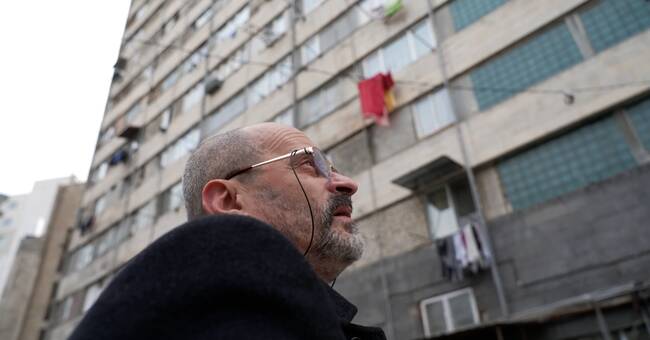Gocha Gvaramia shows around the dark corridor, high up in the dilapidated 14-storey building in the Georgian capital Tblisi.
He shows us into the simple room where he lives with his wife.
In the room next door, past the entrance to the elevator, his son is sleeping.
- My family, we are still grateful for what we have, he says.
- Many others here remove six to seven people of only twelve square.
It's not real life.
An open wound
This has been his home for almost three decades, ever since the war in the Russian-backed Abkhaz region in the early 1990s.
Like most of the longer-term residents, Gocha came here as a refugee.
He himself is a veteran of the war and today runs several news sites where he analyzes the conflict that today has turned into a frozen one.
The house and the one next to it were dormitories before the government housed the refugees here.
Since then, they have passed into the possession of the inhabitants.
Even today it is very simple and in the two buildings that are connected today live up to 500 families.
- Of course, the conflict is still present here, Gocha states.
"Symbolic punishment"
Riots between Georgia and its Russian-backed breakaway regions have been going on for a long time and flared up several times.
Tensions against Russia have also escalated, reaching a crescendo in 2008 with Russia's invasion of Georgia.
Now that Russia is gathering troops at the border with Ukraine, many Georgians see clear parallels.
Batu Kutelia, a former US ambassador and deputy defense minister, emphasized that Russia's actions against Ukraine were only a continuation of what struck Georgia in 2008.
With Georgia, Russia wants to symbolically punish those who approach the West.
With Ukraine, this is seen as the last chance to stop Ukraine from modernizing.
Rejects Russian demands
Several opinion polls show that a large majority of Georgians support NATO membership and many NATO advocates believe that the Ukraine situation is right for them.
But Russia calls Georgian and Ukrainian NATO membership a "red line" that must not be crossed.
Kutelia, who is today an opposition politician and a strong advocate of NATO, dismisses those demands blankly.
- Russia is not in a position to make any demands, he says.
- If they achieve something there, then only new demands will come.
It's a terrorist tactic.
Hope to return
For Gocha Gvaramia, it is clear that Ukraine's situation is linked to Georgia's, and that Russia is responsible.
Despite the protracted conflict, he hopes to one day be able to return home.
- Of course.
If we could return tomorrow, we would have done it.
But as they say, it's easier to tear down than to build something.

